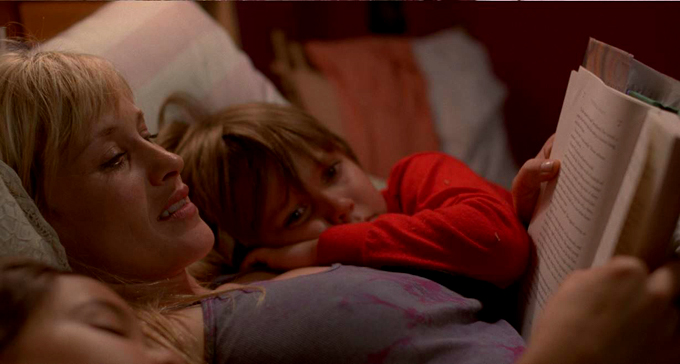
Here’s my Top Ten list for 2014:
- Boyhood (available on DVD from Netflix and streaming from Amazon Instant, iTunes, Vudu, YouTube, Google Play and Xbox Video)
- Ida (available on DVD from Netflix and streaming from Amazon Instant, YouTube, Google Play and Xbox Video.)
- Dear White People (available on DVD from Netflix starting on February 3, 2015)
- Birdman
- Gone Girl (available on DVD from Netflix and streaming on Amazon Instant, iTunes, Vudu, YouTube, Google Play, Xbox Video and Flixster)
- Locke (available on DVD from Netflix and Redbox and streaming from Amazon, iTunes, Vudu, YouTube, Google Play and Xbox Video.)
- Force Majeure
- Calvary (available on DVD from Netflix and streaming from Amazon Instant, iTunes, YouTube, Google Play and Xbox Video)
- Alive Inside (available streaming on iTunes)
- American Sniper
And here’s the rest of the best:
- Selma
- Two Days, One Night
- True Detective (the HBO mini-series now available on DVD from Netflix and streaming on HBOGO.)
- A Coffee in Berlin (available on DVD from Netflix and streaming from Amazon, Vudu, YouTube and Google Play)
- Borgman – available on DVD from Netflix and streaming from Amazon, iTunes, Vudu, YouTube, Google Play and Xbox Video.
- The Grand Seduction (available on DVD from Netflix and streaming from Amazon Instant, YouTube, Google Play and Xbox Video.)
- Class Enemy (a provocative Slovenian classroom drama that I saw at Cinequest but which is not currently available to US audiences)
- Heavenly Shift ( an outrageously dark Hungarian comedy that I also saw at Cinequest but which is not currently available to US audiences)
BOYHOOD: why is this movie so profoundly moving?
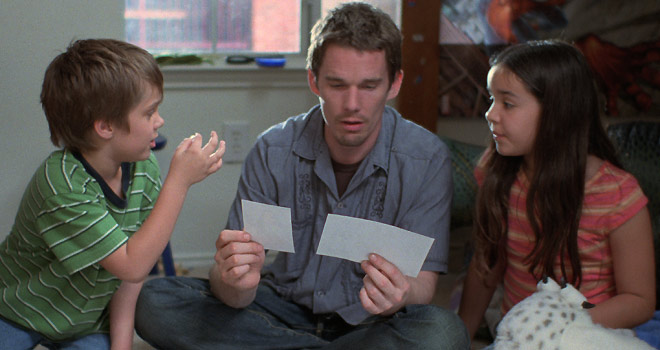
Boyhood is a profoundly moving film – and I’m still trying to figure out why. It’s a family drama without a drop of emotional manipulation – there’s no big moment of redemption and no puppies are saved. It’s just about a boy growing up in a family that we all can recognize and going through a series of moments that all of us have gone through. Still, I found myself responding very emotionally and, hardass as I may be, I had a lump in my throat and moist eyes during the last half hour or so.
There’s a sense of fundamental human truth in Boyhood that comes from the amazing, risky and groundbreaking way that writer-director Richard Linklater made this movie. Boyhood traces the story of Mason (Eller Coltrane), his big sister (Lorelei Linklater) and their divorced parents (Patricia Arquette and Ethan Hawke) from the time when Mason was six-years-old to when he is going off to college at age 18. Linklater and the cast shot the movie in 39 days over a TWELVE YEAR PERIOD. So the cast members actually aged twelve years without the need for creating that effect with makeup or by switching the child actors. Other than Linklater’s own Before Sunrise/Before Sunset/Before Midnight series of romances spaced nine years apart, he only movies that have used this technique of aging-in-real-time have been documentaries, most notably the 7 Up series and Hoop Dreams.
Besides the authenticity that comes from the aging-in-real-time, the key to Boyhood is the reality of each moment. Each scene in the film is universal. Every kid has had to suffer the consequences of the life decisions made by his/her parents. Every kid has felt disrespected by a parental edict or disappointed when a parent has failed to come through. Everybody has been bullied in the school bathroom. Everybody has felt the excitement of connecting with a first love – and then the shock/humiliation/heartbreak of getting dumped. No scene individually moves the plot forward. But each scene helps complete our picture of who Mason is and how he is being shaped by his experiences.
Of course, when parents divorce and when a kid’s family is blended with that of a step-parent’s, those are especially big deals. All those things happen to Mason in Boyhood; he has control over none of them, but they all have a lasting impact on his life and development. And when his mom decides to better herself by working her way through college and grad school to become a college instructor, her self-improvement makes her less available to her kids – and that’s a big deal, too. (This part of Linklater’s story is autobiographical.)
As we trace Mason’s early years, we relate to these universal experiences and, without noticing it, start rooting for him and his sister. By the time he is 15, we are hooked and so seriously invested in him that it’s easy to feel as much pride in his high school graduation as do his fictional parents.
The actors who begin as children and age into young adults – Eller Coltrane and Lorelei Linklater (the director’s daughter) – are very good. Arquette and Hawke are also excellent in playing warts-and-all parents; each parent grows (in different ways) over the twelve years as much as do their kids.
So what’s it all about – as in, what’s life all about? That question is addressed explicitly by four characters in separate scenes in the final 35 minutes of the movie – by Mason as a brash and cynical, bullshitting 17-year-old, by his mom in a self-reflective meltdown, by his dad in a moment of truthful humility and by a potential girlfriend wise beyond her years. Whether any one of them is right and whether any one of them speaks for the filmmaker – that’s up to you.
Linklater has made other films that are exceptional and groundbreaking, most notably the Before series. His indie breakthrough Slacker followed a series of characters, handing off the audience to one conversation to another – a structure seemingly without structure. He followed that his Waking Life, another random series of conversations with his live actors were animated by rotoscope. Even his recent dark comedy Bernie is offbeat – a sympathetic take on a real life murderer (who is now out of prison and living in Linklater’s garage apartment). But Boyhood is Linklater’s least talky movie – and his masterpiece.
Boyhood is an important film – a milestone in the history of cinema. (I sure didn’t expect that I would ever write that sentence.) It may turn out to be the best film of the decade. It’s a Must See.
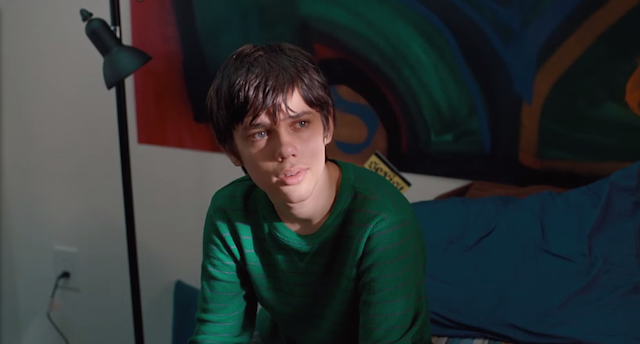
IDA: exquisite filmmaking about making an informed choice
The title character in the Polish drama Ida is a novice nun who has been raised in a convent orphanage. Just before she is to take her vows in the early 1960s, she is told for the first time that she has an aunt. She meets the aunt, and Ida learns that she is the survivor of a Jewish family killed in the Holocaust. The aunt takes the novice on an odd couple road trip to trace the fate of their family.
The chain-smoking aunt (Agata Kulesza) is a judge who consumes vast quantities of vodka to self-medicate her own searing memories. But the most profound difference isn’t that the aunt is a hard ass and that the nun is prim and devout. The most important contrast is between their comparative worldliness – the aunt has been around the block and the novice is utterly naive and inexperienced (both literally and figuratively virginal). The young woman must make the choice between a future that follows her upbringing or one which her biological heritage opens to her. As Ida unfolds, her family legacy makes her choice an informed one.
The novice Ida, played by newcomer Agata Trzebuchowska, is very quiet – but hardly fragile. Saying little, she takes in the world with a penetrating gaze and a just-under-the-surface magnetic strength.
Superbly photographed in black and white, each shot is exquisitely composed. Watching shot after shot in Ida is like walking through a museum gazing at masterpiece paintings one after the other. Ida was directed and co-written by Pawel Pawlikowski, who also recently directed the British coming of age story My Summer of Love (with Emily Blunt) and the French thriller The Woman in the Fifth (with Kristin Scott Thomas and Ethan Hawke). He is an effective and economic story-teller, packing textured characters and a compelling story into an 80 minute film.
Ida is also successful in avoiding grimness. Pawlikowski has crafted a story which addresses the pain of the characters without being painful to watch. There’s some pretty fun music from a touring pop/jazz combo and plenty of wicked sarcasm from the aunt.
Ida won the International Critics’ Award at the Toronto International Film Festival. Ida was my pick as the best film at Cinequest, where it won the Jury Prize for Best Narrative Feature.
DEAR WHITE PEOPLE: a hilarious movie that’s dead serious about identity
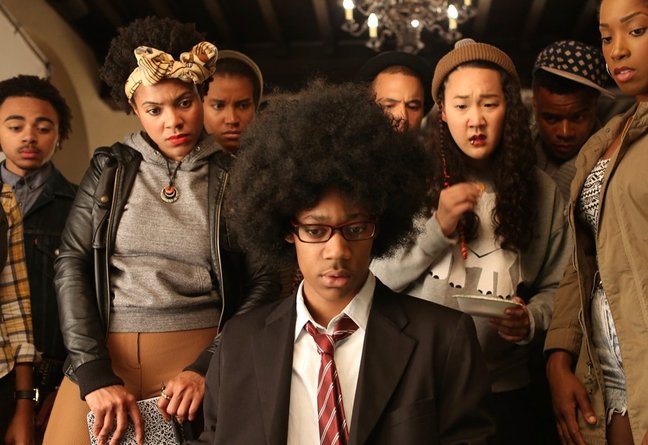
On its surface, the brilliant comedy Dear White People seems to be about racial identity, but – as writer-director Justin Simien points out – it’s really about personal identity (of which race is an important part). Set at a prestigious private college, Dear White People centers on a group of African-American students navigating the predominantly white college environment.
Each of the four primary characters has adopted a persona – choosing how they want others to view them. Middle class Sam is a fierce Black separatist (despite her White Dad and her eyes for that really nice White boy classmate). Coco, having made it to an elite college from the streets, is driven to succeed socially by ingratiating herself with the popular kids. Kyle, the Dean’s son, is the college BMOC, a traditional paragon, but with passions elsewhere. Lionel is floundering; despite being an African-American gay journalist, he doesn’t fit in with the Black kids, the LGBT community or the journalism clique. All four of their self-identities are challenged by campus events.
This very witty movie is flat-out hilarious. The title comes from Sam’s campus radio show, which features advice like “Dear White People, stop dancing!” and Dear White People, don’t touch our hair; what are we – a petting zoo?”. While the movie explores serious themes, it does so through raucous character-driven humor. It’s a real treat.
It’s the first feature for writer-director Justin Simien and it’s a stellar debut.
BIRDMAN: nothing like you’ve seen before
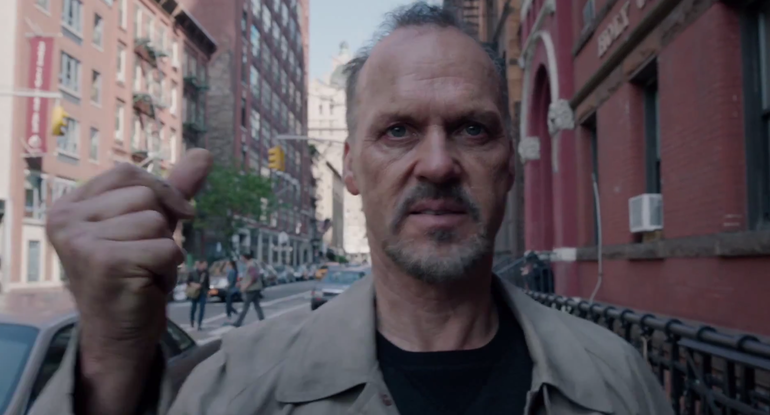
Startlingly original, Birdman, is NOTHING like you’ve seen before – in a good way. It’s the latest from filmmaker Alejandro González Iñárritu (Amores Perros, 21 Grams, Babel, Biutiful) and his biggest departure from the conventions of cinema.
The story is essentially a show biz satire centered on a Broadway staggering toward opening night. The show is a literary four-hander, adapted by, produced by and starring an actor (Michael Keaton) who made it big in a superhero movie franchise; he has bet his nest egg on this show, which he figures to relaunch his career as a serious actor. As one would expect, we have four colorfully neurotic actors and an anxious manager in a very stressful situation and stuff goes comically wrong.
Iñárritu reveals his story by having the camera follow the characters up, down and around the theater’s backstage, its dressing rooms, the stage itself, the roof and even outside on Times Square. Indeed, Iñárritu and Lubezki make New York’s theater district another character in the movie. This is NOT obnoxious Shaky Cam – just very immediate and urgent camera work that enhances the story.
The effect of all this is to create the illusion that the movie was shot in one long, intricately choreographed shot. Which it wasn’t – but we’re too engaged in the story to look for the cuts.
It’s the most brilliant exercise in cinema since Gravity – the film directed by Iñárritu’s pal Alfonso Cuarón and shot by the same cinematographer, Emmanuel Lubezki. Besides the visually stunning Gravity, Lubezki photographed the astonishing four-minute-plus “car attack” tracking shot in Children of Men AND the last three Terence Malick films, so maybe it’s time that we start looking out for the next Lubezki film.
All of the very best movie comedies are character driven, and Birdman‘s are well-written and uniformly superbly acted. I’m sure that Keaton will grab an Oscar nomination for his actor/producer, a guy who is barely clinging on to his present and future by his fingernails. Edward Norton is brilliant as an actor of spectacular talent, selfishness and unreliability. Naomi Watts and Andrea Riseborough (so compelling in last year’s underrated thriller Shadow Dancer) are excellent as especially needy actresses. But I found Emma Stone’s performance as Keaton’s sulking daughter to be extraordinary; her character has an angry outburst that is jaw dropping.
One more thing – there are episodes of magical realism throughout Birdman; (it opens with Keaton’s actor levitating in his dressing room). That did NOT work for me. I get that Iñárritu is making a point about Keaton’s actor losing control and trying to regain control, etc., but the characters, the acting, the camera work and the comic situations were enough for me, and I found his violating the laws of physics to be distracting.
Still, Birdman is a Must See for anyone looking for an IMPORTANT movie and for anyone looking for a FUNNY one.
GONE GIRL: best Hollywood movie of the year
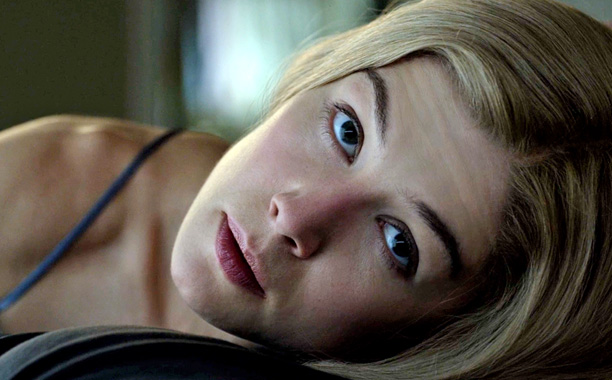
In the marvelously entertaining Gone Girl, Ben Affleck plays Nick, a good-looking lug who can turn a phrase. At a party one night, he’s on his A game, and he snags the beautiful Amy (Rosamund Pike). She’s smarter, a good rung on the ladder more attractive than he is, has parents with some money and is a second-hand celebrity to boot. Not particularly gifted and certainly not a striver, he knows he’s the Lucky One. He has married above himself, but he doesn’t have a clue HOW MUCH above until she suddenly disappears.
Based on the enormously popular novel by Gillian Flynn (who also wrote the screenplay), Gone Girl is the mystery of what has happened to Amy and what is Nick’s role in the disappearance. Plot twists abound, but you won’t get any spoilers from The Movie Gourmet.
This is Rosamund Pike’s movie. Her appearance is so elegant – she looks like a crystal champagne flute with blonde hair – that pulling her out of Victorian period romances into this thriller is inspired. And Pike responds with the performance of her career. She’s just brilliant as she makes us realize that there’s something behind her eyes that we hadn’t anticipated, and then keeps us watching what she is thinking throughout the story.
Gone Girl is directed by the contemporary master David Fincher (Fight Club, Se7en, Zodiac, The Social Network, The Girl with the Dragon Tattoo). Here, Fincher has successfully chosen to rely on Flynn’s page turner of a story and the compelling characters, so Gone Girl is the least flashy of his films, but one of the most accessible. I’ll say this for Fincher – I can’t remember a more perfectly cast movie.
Kim Dickens (Treme, Deadwood) is superb as the investigating detective – this time almost unrecognizable as a brunette. Tyler Perry is wonderfully fun as a crafty celebrity attorney. The unheralded Carrie Coon is excellent as Nick’s twin sister (I want to see more of her in the movies). Missi Pyle does such a good job as a despicable cable TV personality that I thought I was actually watching a despicable cable TV personality. And David Clennon and (especially) Lisa Banes positively gleam as Amy’s parents. (Carefully observe every behavior by the parents in this movie.)
Just like the thug in The Guard who forget whether he had been diagnosed in prison as a sociopath or a psychopath, I had the ask The Wife, who turned me on to this passage from Psychology Today. It’s useful to read this because, although you don’t realize it for forty-five minutes or so, Gone Girl is also a study of psychopathy.
Psychopaths … are unable to form emotional attachments or feel real empathy with others, although they often have disarming or even charming personalities. Psychopaths are very manipulative and can easily gain people’s trust. They learn to mimic emotions, despite their inability to actually feel them, and will appear normal to unsuspecting people. Psychopaths are often well educated and hold steady jobs. Some are so good at manipulation and mimicry that they have families and other long-term relationships without those around them ever suspecting their true nature.
When committing crimes, psychopaths carefully plan out every detail in advance and often have contingency plans in place. Unlike their sociopathic counterparts, psychopathic criminals are cool, calm, and meticulous. Their crimes, whether violent or non-violent, will be highly organized and generally offer few clues for authorities to pursue. Intelligent psychopaths make excellent white-collar criminals and “con artists” due to their calm and charismatic natures.
Gillian Flynn changed the story’s ending for the movie. The Wife, who is a big fan of the novel, didn’t mind. Gone Girl is recommended for both those who have and have not read the book. I understand that there’s more humor in the movie, as we occasionally laugh at the extremity of the behavior of one of the characters.
It all adds up into a remarkably fun movie and one that I’m still mulling over days later. Gone Girl is the best Hollywood movie of 2014 so far.
LOCKE: a thriller about responsibility
 The thriller Locke is about an extremely responsible guy (Tom Hardy) who has made one mistake – and he’s trying to make it right. But trying to do the responsible thing in one part of your life can have uncomfortable consequences in the others. The title character drives all night trying to keep aspects of his life from crashing and burning.
The thriller Locke is about an extremely responsible guy (Tom Hardy) who has made one mistake – and he’s trying to make it right. But trying to do the responsible thing in one part of your life can have uncomfortable consequences in the others. The title character drives all night trying to keep aspects of his life from crashing and burning.
In fact, he never leaves the car and, for the entire duration of the movie, we only see his upper body, his eyes in the rearview mirror, the dashboard and the roadway lit by his headlights. All the other characters are voiced – he talks to them on the Bluetooth device in his BMW. Sure, that’s a gimmick – but it works because it complements the core story about the consequences of responsibility.
Locke is written and directed by Steven Knight (Dirty Pretty Things, Eastern Promises). The story is actually a domestic drama – there are no explosions to dodge, no one in peril to rescue and no bad guys to dispatch. But it’s definitely a thriller because we care about whether Locke meets the two deadlines he will face early the next morning.
It’s a masterful job of film editing by Justine Wright (Touching the Void, The Last King of Scotland). After all, her cuts help keep us on the edge of our seats, despite her working with a very finite variety of shots (Locke’s eyes, the dashboard, etc.).
Hardy, who’s known as an action star, is excellent at portraying this guy who must try to keep his family, biggest career project and self-respect from unraveling at the same time, only armed with his ability to persuade others. It’s a fine film.
FORCE MAJEURE: some things you just can’t get past
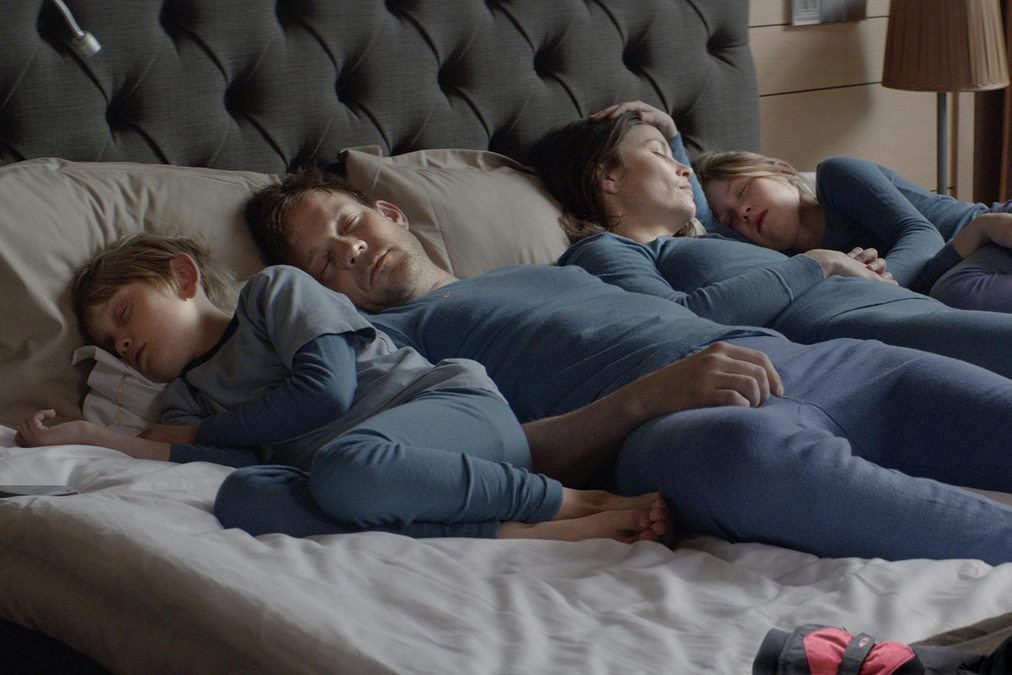
In the droll Swedish dramedy Force Majeure, a smugly affluent family of four vacations at an upscale ski resort in the French Alps. The wife explains to a friend that they take the vacation because otherwise the husband never sees the family. But, while the wife is blissed out, the kids fidget and complain, and the hubby sneaks peeks at his phone.
Then there’s a sudden moment of apparent life-and-death peril; the husband has a chance to protect the wife and kids, but instead – after first securing his iPhone – runs for his life. How do they all go on from that revealing moment? The extent that one incident can bring relationships into focus is the core of Force Majeure.
Clearly, the family has a serious issue to resolve, but there’s plenty of dry humor. In the most cringe worthy moments, the wife tries to contain her disgust, but can’t keep it bottled up when she’s in the most social situations. The couple repeatedly huddle outside their room in their underwear to talk things out, only to find themselves observed by the same impassive French hotel worker. The most tense moments are interrupted by an insistent cell phone vibration, another guest’s birthday party and a child’s remotely out-of-control flying toy.
Force Majeure is exceptionally well-written by writer-director Ruben Ostland. It’s just his fourth feature and the first widely seen outside Scandinavia. He transitions between scenes by showing the machinery of the ski resort accompanied by
Baroque organ music – a singular and very effective directorial choice.
Force Majeure is Sweden’s submission for the Best Foreign Language Oscar. I think it deserves an Oscar nomination, although I can’t see it beating out Ida or Leviafan.
[I’ve included the trailer as always, but I recommend that you see the movie WITHOUT watching this trailer – mild spoilers]
CALVARY: dark, tense and mesmerizing
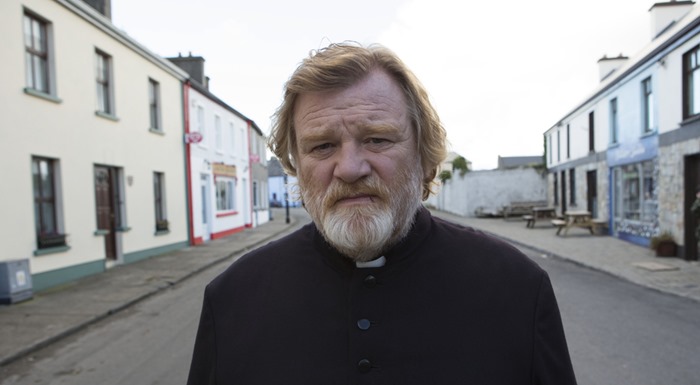
The superbly written drama Calvary opens with a startling line, which kicks off the unsettling premise. Brendan Gleeson (In Bruges, The Guard, The Grand Seduction) plays a very good man who is an Irish priest, Father James. In the confessional, a man tells him that – in one week – he will kill Father James. Having been molested by a priest (now dead), the man will make his statement against the Church: “There’s no point in killing a bad priest. I’m going to kill you because you’re innocent.”
Who is the man? (Father James figures it out before the audience does.) Will the execution really happen? Will Father James take steps to protect himself? Tension builds as the days count down.
The character of Father James is wonderfully crafted. Having come to the priesthood in midlife, after being married and having a secular career, he is seasoned and unburdened by high expectations of human nature – and has a wicked sense of humor. Yet he is moral in the best sense and profoundly compassionate. And Gleeson – always excellent – nails the role. It’s one of the finest leading performances of the year.
We know that the killer comes from a very limited pool of villagers and would-be parishioners, played by Chris O’Dowd, Dylan Moran, Aidan Gillen, M. Emmet Walsh, Isaach de Bankole and Orla O’Rourke. Their feelings for Father James range from fondness to indifference. Their attitudes toward the Church, on the other hand, range from indifference to hostility. (Moran is the best – playing a man grappling with his unhappiness, despite enjoying a fortune built by exploiting others. )
None of these characters is a stereotype. It’s a quirky bunch – but not CUTE quirky. There’s a lot of buried rage in this village – and dry humor, too. Referring to his wife, one casually says, “I think she’s bipolar, or lactose intolerant, one of the two”.
But it’s not the the villagers that Father James must deal with. He gets a visit from his occasionally suicidal adult daughter (Kelly Reilly, who is ALWAYS good); he loves and welcomes her, but she often contributes more stress. He doesn’t love his roommate, an idiotically shallow priest David Wilmot (the thug in The Guard who hilariously couldn’t figure out if he was a psychopath or a sociopath). Then there’s a seriously twisted imprisoned killer (the star’s son Domnhall Gleeson), a foreign tourist numbed by a sudden tragedy (Marie-Josee Croze) and a scheming bishop (David McSavage).
Writer-director John Michael McDonagh (The Guard) gets the credit for populating his screenplay with enough unique and original characters for an entire film festival, let alone one movie. After The Guard and Calvary, I can’t wait to see his next movie.
As one should ascertain from its title, Calvary ain’t a feel-good movie. It plumbs some pretty dark territory. But as we follow Brendan Gleeson’s extraordinary performance as a good man navigating a grimly urgent situation, it is mesmerizing.
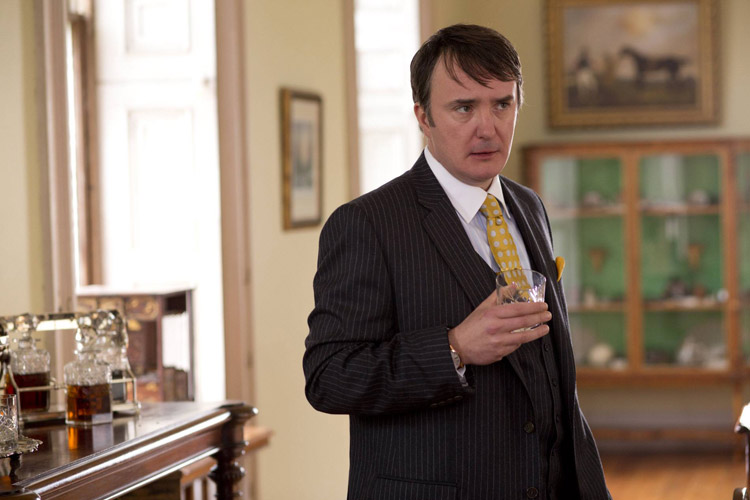
ALIVE INSIDE: people astonishingly transformed by music
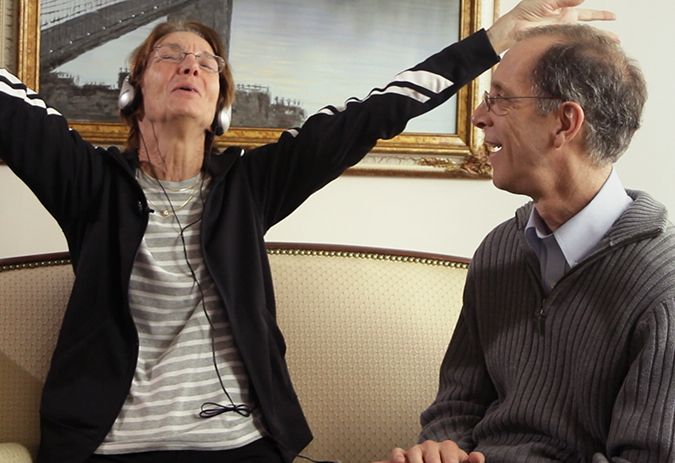 Alive Inside is one of the most emotionally powerful documentaries that I’ve EVER seen. Seemingly miraculously, Alzheimer’s patients are transformed by music. The music doesn’t cure Alzheimer’s, but it pulls the patients out of isolation, helps them relate to other people and brings them joy.
Alive Inside is one of the most emotionally powerful documentaries that I’ve EVER seen. Seemingly miraculously, Alzheimer’s patients are transformed by music. The music doesn’t cure Alzheimer’s, but it pulls the patients out of isolation, helps them relate to other people and brings them joy.
Alive Inside tells the story of a solitary guy, Dan Cohen, and his tiny non-profit Music & Memory, which distributes iPods to Alzheimer’s patients. Michael Rossato-Bennett filmed Cohen’s work to prepare a video for Music & Memory. That original six-and-a-half minute video went viral. Rossato-Bennett realized that he had the beginnings of a movie, and, several years later, Alive Inside is the result.
Alive Inside won an Audience Award at Sundance, and I think that Alive Inside will be one of the two favorites for the Academy Award for Best Documentary Feature. It’s already on my list of Best Movies of 2014 – So Far.
All that aside, it’s a riveting film – and an example of the power of cinema. It’s impossible not to be moved when people essentially recover their humanity. And when you leave the theater, you’ll likely be thinking about making sure that your kids have your playlist. Alive Inside is now available streaming on iTunes.
AMERICAN SNIPER: a hero in battle, a tinderbox back home
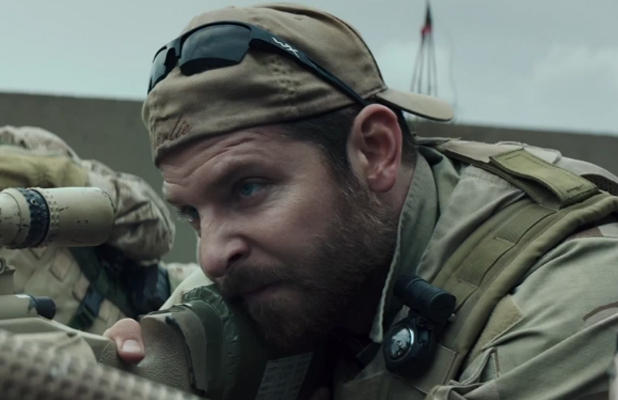
In Clint Eastwood’s real-life story American Sniper, Bradley Cooper plays Chris Kyle, the most effective sniper in US military history. A Navy Seal in the Iraq War, Kyle signed up for a soul-sucking four tours. American Sniper is about how he survived those searing war experiences and how he did/did not cope with the emotional legacy of those experiences back in the USA.
Nobody should have to see and endure what Kyle (and tens of thousands of his comrades) did. Kyle was that recognizable American male who refused to admit that his experience could be taking an emotional toll. As a result, he’s constantly on the verge of being blown up in the war scenes and on the verge of imploding in the scenes back home. Sometimes there’s more danger in the domestic scenes than in the war action scenes.
The war scenes are convincing, brutal and adrenalin-packed. The final battle scene is one of the most harrowing I’ve ever seen in a movie. While Kyle’s unit is under siege, we can see what his headquarters is seeing on the high tech satellite view – and it looks increasingly hopeless. When the situation is at it most desperate, a sand storm hits, and suddenly we’re immersed into the fog (sand?) of war, trying to tell who is who and what is happening.
And here’s an observation on violence in Eastwood movies. Clint used to trade in good old fashioned movie violence as he shot ’em up in westerns, war action films and the Dirty Harry series. But beginning with Unforgiven, all of Eastwood’s films have featured only the most realistic violence. With Unforgiven, a toggle switched inside Clint, and he must have determined to use violence only for STORYTELLING and never for ENTERTAINMENT. This is the case with American Sniper.
This may be Bradley Cooper’s finest performance. He is perfect as the Everyman hero surviving battle, but clinging on by his fingernails in peacetime. It’s a finely modulated performance without a shred of PTSD cliche. The other actors (including Sienna Miller as the wife) are just fine, but their roles are relatively underwritten.
American Sniper is a very strong movie, compelling and thoughtful.
SELMA: igniting the tide of history

It’s been a while since I’ve seen as stirring a movie as Selma, Director Ava DuVernay’s retelling of the Selma, Alabama, Civil Rights marches in 1965 – one of the most heroic episodes in a saga known for heroism.
It’s an important story. Although the marches came on the heels of a racist atrocity, instead of just vomiting rage, Martin Luther King (David Oyelowo) and his fellow civil rights leaders had a specific strategic goal in mind. Their planned civil rights march from Selma to Montgomery was designed to trigger the passage of yet-to-be-drafted legislation, the Voting Rights Act of 1965. They knew that there would be risks to all and sacrifices by many – both martyrs to the cause and victims of terrorism. Those sacrifices were real and are depicted in the movie. As the civil rights leaders navigate the reefs of local Jim Crow rule and murderous racist terrorism, Selma’s story is compelling minute-to-minute.
King himself must bear the burden of responsibility of a leader sending his charges out to possibly sacrifice their lives. All the time, he is receiving threats to his safety and that of his family, dealing with blackmail and character assassination and going through a rough patch in his marriage to Coretta Scott King (Carmen Ejogo).
But Selma, like history, is not a One Man Show. King doesn’t just dictate the path for his Southern Christian Leadership Council (SCLC). He has to work with his colleagues in the SCLC and reach out to build a coalition with the local African-American community and other national organizations, chiefly the Student Non-violent Coordinating Committee (SNCC). King is not just another noble face. He’s got to show a canny craftiness as a study in negotiating, a guy who knows when to hold ’em and knows when to fold ’em.
Here’s something else that Selma does extraordinarily well. I’m a history buff who understands that – to relate a historical narrative in 90-120 minutes – filmmakers must compress historical events and compound characters. However, Selma allows us to glimpse the broad canvas by seeing other important figures of the Civil Rights movement – Andrew Young, Ralph Abernathy, Hosea Williams, John Lewis, James Forman, Diane Nash, James Bevel, James Orange and even Malcom X and Bayard Rustin. There are also the white martyrs James Reeb and Viola Liuzzo. And New York Times reporter Roy Reed is there, representing the handful of national newsmen who brought the civil rights struggle into the homes of non-Southern America. As villains, we have not just George Wallace (Tim Roth) but Al Mingo and Sheriff Jim Clark.
And what about the controversial depiction of President Lyndon Johnson (Tom Wilkinson)? The short answer is that Selma’s treatment of LBJ is sometimes factually inaccurate and definitely wrong in tone. I am going to discuss this more fully in another post, probably on Wednesday. But the bottom line is this – see the movie anyway. At its core, the movie is about what happened in Selma and within the leadership of the Civil Rights movement – it generally gets that right.
After seeing Selma, I reflected on the media landscape in 1965 – where every home in America watched the TV news from either CBS, NBC or ABC. The repugnant spectacle of the white mob beating the peaceful demonstrators came into every American living room, including mine. We Americans all saw the same thing. But in today’s media environment, a huge fraction of the country gets it news from Fox News, which would likely twist and minimize the very facts that mobilized a nation in 1965 – and another huge fraction would be watching non-news content and miss the controversy all together.
But my most sobering reflection upon leaving the theater was this – right now the Republican Congress and the majority of the US Supreme Court are trying their hardest to emasculate the very Voting Rights Act that was the culmination of the campaign in the movie Selma.
In a uniformly well-acted movie, David Oyelowo deserves special praise for his portrayal of MLK. Oprah Winfrey and veteran character actor Henry G. Sanders are the best of the rest. On a personal note, I relished seeing one of my faves Wendell Pierce (Treme and The Wire) and also up-and-comer Tessa Thompson of Dear White People.
Selma is inspirational, kids should see it and families should discuss it. It’s just outside the Top Ten of my Best Movies of 2014.
TWO DAYS, ONE NIGHT: the limits of emotional endurance
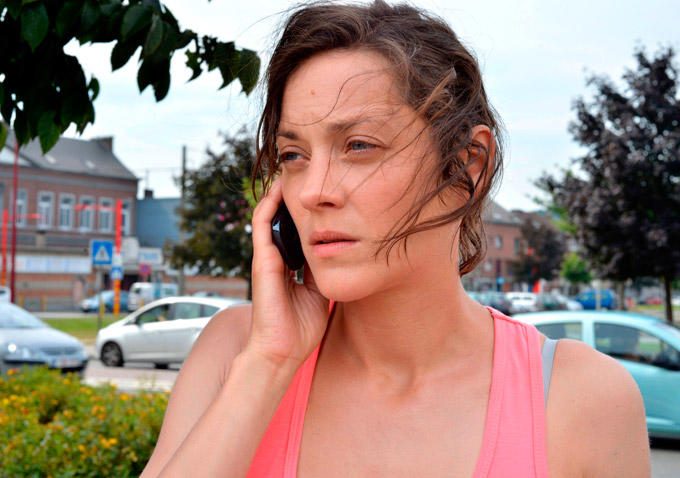
In the Belgian drama Two Days, One Night, a factory worker (Oscar winner Marion Cotillard) finds out on Friday afternoon that she will be laid off unless she can convince nine of her sixteen co-workers to sacrifice their bonuses. She must make her case to each of them before a vote on Monday morning. It’s a substantial bonus, and every one of her colleagues really needs it; their spouses are expecting it, too, and many have decided how they are going to spend it. The vote is going to be close, the stakes for each family is high and the tension builds.
Our protagonist is anything but plucky. She needs to be coaxed and prodded by her husband and a militant co-worker. She is buoyed enough by an early victory to keep going, but she’s constantly on the verge of giving up.
She hasn’t been been well, which also complicates things. Because the filmmakers wait until midway to explicitly reveal her illness, I’m being careful not to spoil it here. But the precise illness is important because it affects both her own stamina and the confidence of her co-workers about how well she would contribute to the workplace.
Two Days, One Night is the latest from two of my favorites writer-director filmmakers, the brothers Jean-Pierre and Luc Dardennes. They specialize in contemporary dramas of the Belgian working class. Their The Kid with a Bike was #1 on my Best Movies of 2012. And I think that their 2002 The Son (Le Fils) was pretty much a masterpiece, too. The Dardennes’ hand held (but NOT shaky) cameras intrude right on top of the characters, bringing an urgency and immediacy to every scene. Hyper realism contributes to the verisimilitude and thereby builds more power into the stories; here, a tense conversation in the doorway to an apartment building get interrupted by someone walking in – just as it would be in real life.
At its core, Two Days, One Night explores the limits of emotional endurance. What does she need to rebound form her malaise – the adrelin surge of battle? Or the power from getting to make her own choice?
[Anyone who has visited France or Belgium will recognize the remarkable politeness of the characters – observing all the formalities of greeting, shaking hands and saying thanks and goodbye even in the most awkward and emotionally charged encounters.]
Unsurprisingly, Cotillard’s glammed-down performance is brilliant. It’s a compelling story as we walk her tightrope of desperation, heading toward redemption.
TRUE DETECTIVE: the eyes of Matthew McConaughey
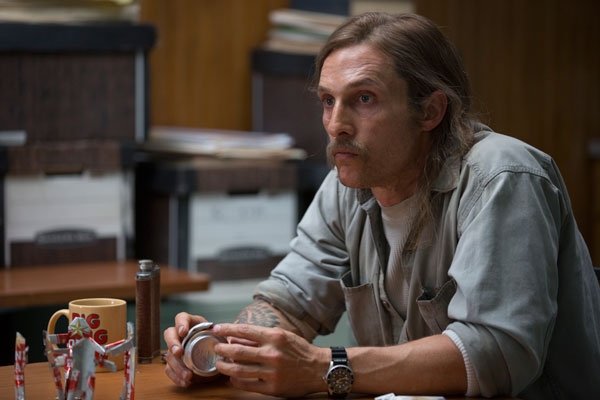
My DVD/Stream of the week – perfect for binge-viewing on the holiday weekend – is the eight one-hour episodes of HBO’s True Detective. It’s a dark tale of two mismatched detectives – each tormented by his own demons – obsessed by a whodunit in contemporary back bayou Lousiana. Woody Harrelson is very good – but Matthew McConaughey’s performance may have been the best on TV this year.
The two detectives are shown pursuing a case together in 1995 and then being interviewed separately about it in 2012. In the 2012 scenes, McConaughey sits at a table, his eyes dead but occasionally flashing, behind a coffee mug and an increasing lineup of empty beer cans. He chain smokes and stares down his interrogators – doing very little with frightening intensity. McConaughey has recently delivered brilliant performances in excellent movies (Mud, Bernie, The Paperboy, Killer Joe, The Wolf of Wall Street, Dallas Buyers Club) – and this may be his best. McConaughey is reason enough to watch True Detective.
True Detective is available on DVD from Netflix and streaming from HBO GO.
A COFFEE IN BERLIN: slacker minus coffee equals plenty of laughs
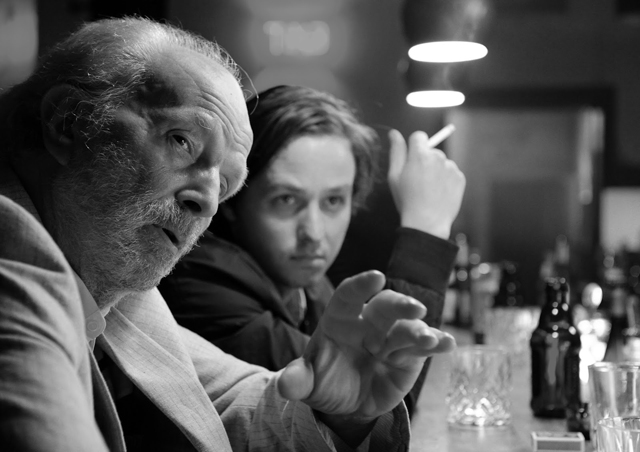
Ranging from wry to hilarious, the German dark comedy A Coffee in Berlin hits every note perfectly. It’s the debut feature for writer-director Jan Ole Gerster, a talented filmmaker we’ll be hearing from again.
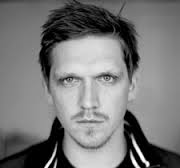
We see a slacker moving from encounter to encounter in a series of vignettes. Gerster has created a warm-hearted but lost character who needs to connect with others – but sabotages his every opportunity. He has no apparent long term goals, and even his short term goal of getting some coffee is frustrated.
As the main character (Tom Schilling) wanders through contemporary Berlin, A Coffee in Berlin demonstrates an outstanding sense of place, especially in a dawn montage near the end of the film. The soundtrack is also excellent – the understated music complements each scene remarkably well.
I saw A Coffee in Berlin (then titled Oh Boy) at Cinequest 2013 and singled it out as one of the three most wholly original films in the festival and as one of my favorite movie-going experiences of the year. A Coffee in Berlin was snagged for the festival by Cinequest’s film scout extraordinaire Charlie Cockey.
BORGMAN: witty and non-gory horror for adults
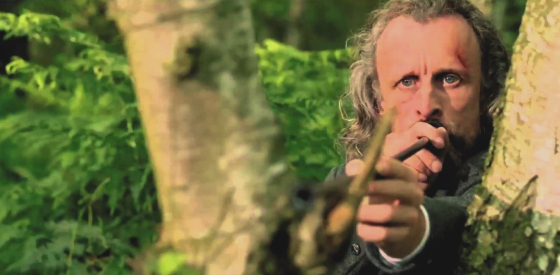
Technically, the Dutch thriller Borgman is a horror film, but it’s horror for adults, without the gore and with lots of wit. The shock doesn’t come from monsters unexpectedly lurching out of nowhere. The entertainment comes from the OMG moments of the “don’t ask the weird guy into your house!” and “don’t let the sinister guys watch your kids!” variety.
The setting is the architecturally striking and well-tended home of an affluent Dutch family and their Danish nanny. The husband is an aggro corporate schemer who is a real scumbag – selfish, racist and chauvinistic, with the capacity for a violent rage. His wife Marina is repressed and neurotic. But they are highly functional until a homeless guy, Camiel Borgman, happens by and circumstances compel them to put him up. Borgman feels entitled to more and more outrageous impositions – and soon it’s apparent that he’s even more sinister than he is obnoxious.
What if Charles Manson wasn’t a drug addled hoodlum and instead used his deranged charisma with remarkable skill? Borgman leads a crew of normal looking but murderous henchmen, who operate with the ruthless efficiency of Navy Seals. (Watch for the scar near the younger woman’s shoulder-blade.) Vaguely gifted with mind control, he can apparently create dreams by squatting naked gargoyle-like above Marina while she slumbers with her husband. There is violence aplenty, but it tends to come through a bonk on the head or some poison in a glass.
Dark comedy stems from the matter-of-factness of the murders and body disposal (as in tossing corpses into a lake and then diving in for a relaxing swim). Every once in a while, there’s a hilariously sinister moment, like the supremely random appearance of some whippets that seem more like hellhounds.
The acting is uniformly excellent, including the kids, but Jan Bijvoet as Borgman and Hadewych Minis as Marina are stellar.
Some questions are never answered (who are those three guys at the beginning and why are they hunting the homeless guys?). Is this a cult or aliens or what? The audience needs to accept some ambiguity. But the overall story arc is clear – no good is going to come of these people once they meet Camiel Borgman and his friends.
There is a subtext here: is this family so bourgeois that it deserves its fate? Fortunately, this subtext isn’t as in-your-face as in some recent self-loathing Eurocrap like Happy Days or Finsterworld, so it’s not at all off-putting. But Borgman can be enjoyed without going there at all.
Borgman is superbly written and directed by Alex van Warmerdam, a 62-year-old Dutch actor with only a handful of writing and directing credits.
I don’t often recommend a horror movie, but I’m all in on Borgman. Take it from me – you haven’t seen this movie before, and it’s endlessly entertaining. Borgman is available on DVD from Netflix and streaming from Amazon, iTunes, Vudu, YouTube, Google Play and Xbox Video.
THE GRAND SEDUCTION: the year’s funniest comedy
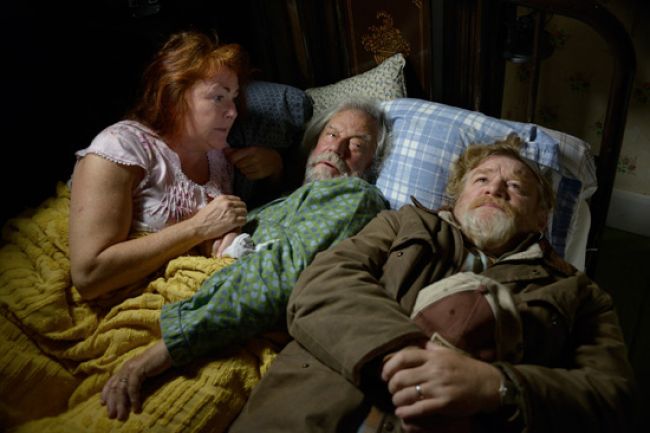
The Canadian comedy The Grand Seduction is the funniest movie of the year so far. It’s a MUST SEE.
Brendan Gleeson (In Bruges, The Guard, The General, Braveheart) and Gordon Pinsent (Away from Her) play isolated Canadians try to snooker a young doctor (Taylor Kitsch of Friday Night Lights) into settling in their podunk village. They enlist the entire hamlet in an absurdly elaborate and risky ruse, and the result is a satisfying knee-slapper that reminds me of Waking Ned Devine with random acts of cricket.
The Grand Seduction opened this year’s Cinequest on an especially uproarious note. The audience, including me and The Wife, rollicked with laugh after laugh. Like Ned Devine, I think that The Grand Seduction can become a long-running imported art house hit like The Best Exotic Marigold Hotel or The Full Monty.

